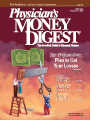Publication
Article
Physician's Money Digest
How Much Do You Need Saved to Retire?
Author(s):
Some questions are easy toanswer, like who was the firstUS president? Others—likewhat is the meaning of life?—are abit more difficult. The question ofhow much you will need to retire,while seemingly difficult on the surface,can be made much clearerthrough careful planning.
New York
Times
According to a recent report, there are many theoriesabout retirement income. Somebelieve that retirees need as much as80% of their preretirement incomein order to live comfortably oncethey stop working. Others believethat percentage is too high, especiallyif the mortgage on your homehas already been paid off, or you arewilling to relocate to a part of thecountry with a lower cost of living.In those cases, advisors believe thatbetween 40% and 60% of your preretirementincome should be sufficient. Your lifestyle, and how muchyou may be willing to adjust it, alsoplays into the equation.
EQUATION FOR SAVING
No matter which theory you subscribeto, results of a recent surveyhave made 2 things perfectly clear:Many people are mistaken about thecost of retiring, and these mistakescan be avoided by careful planning.
According to the survey, mostpeople who are anywhere from 1 to5 years away from retiring have afuzzy picture of what the costs willbe. Individuals nearing retirementwho responded to the survey believetheir retirement expenses will rangesomewhere between 75% and 100%of their preretirement expenses.Survey respondents who have alreadyretired overwhelmingly indicated(74.9%) that they found retirementto be about as expensive asthey had thought. Only 15.3%found it more expensive, and 9.8%found it less expensive.
The survey revealed some interestingresults when the variable offinancial planning for retirementwas considered. For example, ofindividuals who did little or noplanning for retirement, 24% foundit more expensive than they hadanticipated, and 9% found it lessexpensive. However, of those whodid a great deal of planning, only12.5% found retirement to be moreexpensive than projected, while analmost equal amount (11.5%) saidit was less expensive.
ALL ABOUT THE PLAN
Clearly, planning for retirement isan important factor. And while planningin and of itself is not an exact science,it's still better than no plan.Where should you start? Three recentlypublished books on retirementcan get you off on the right track.They provide information on retirementlocation, strategy, and finances.
• Retire in Style: 50 AffordablePlaces Across America (NextDecade, Inc; 2001),is written by WarrenBland. It provideseconomic and lifestyleinformation, aswell as numericalrankings of variouslocations as rated bythe author. Location rankings arebased on several categories: qualityof life, cost of living, health care,transportation, and cultural activities.For example, Boulder, Colo,was at the top of the list with 52 outof a possible 60 points, scoring wellon quality of life and recreationalactivities, but only fair in the cost ofliving category. Other top-rankedlocations included Portland, Ore;Asheville, NC; Austin and SanAntonio,Tex; and Gainesville, Fla.
• Retirement on a Shoestring(4th Edition; Globe PequotPress; 2002), iswritten by John Howells,and it features strategiesfor stretching your fi-nances as far as they willgo. If you haven't beensaving and preparing as well as youshould have all these years, this bookwill provide sound advice for how toreduce your expenses. Topics coveredrange from medical expenses to thepros and cons of retiring to lessexpensive areas overseas.
• The Complete Idiot's Guideto Retiring Early(Alpha; 2001), byDee Lee and JimFlewelling. If you'relooking to plan anescape from the ratrace, this book is foryou. The book contains tables andcharts, as well as fill-in-the-blankworksheets that are easy to follow inestablishing a retirement plan. It alsocontains easy-to-understand explanationsof financial terminology.
A financial advisor can workwith you to determine the way youwant to live your retirement years,then plan a road map to help getyou there. After all, without a planand without a map, where are yougoing to go?
